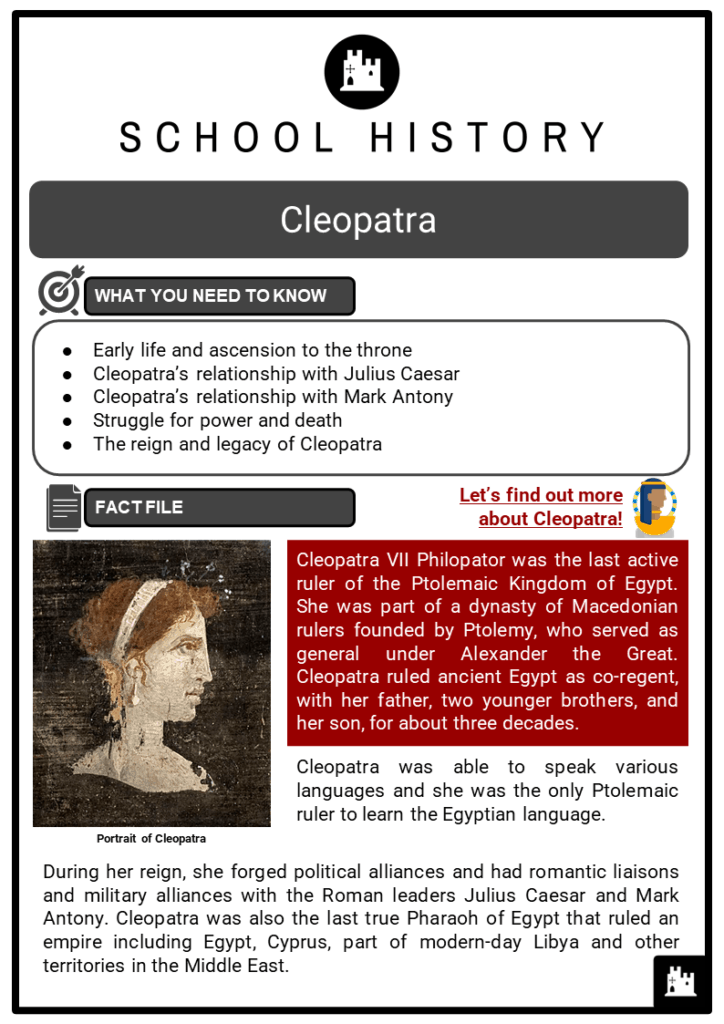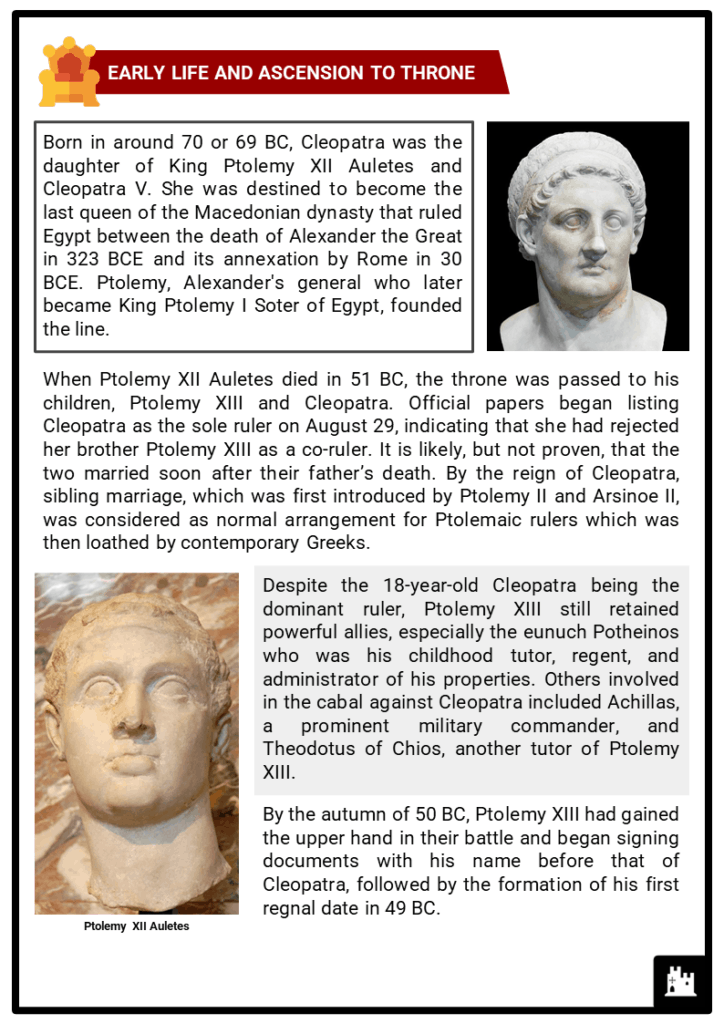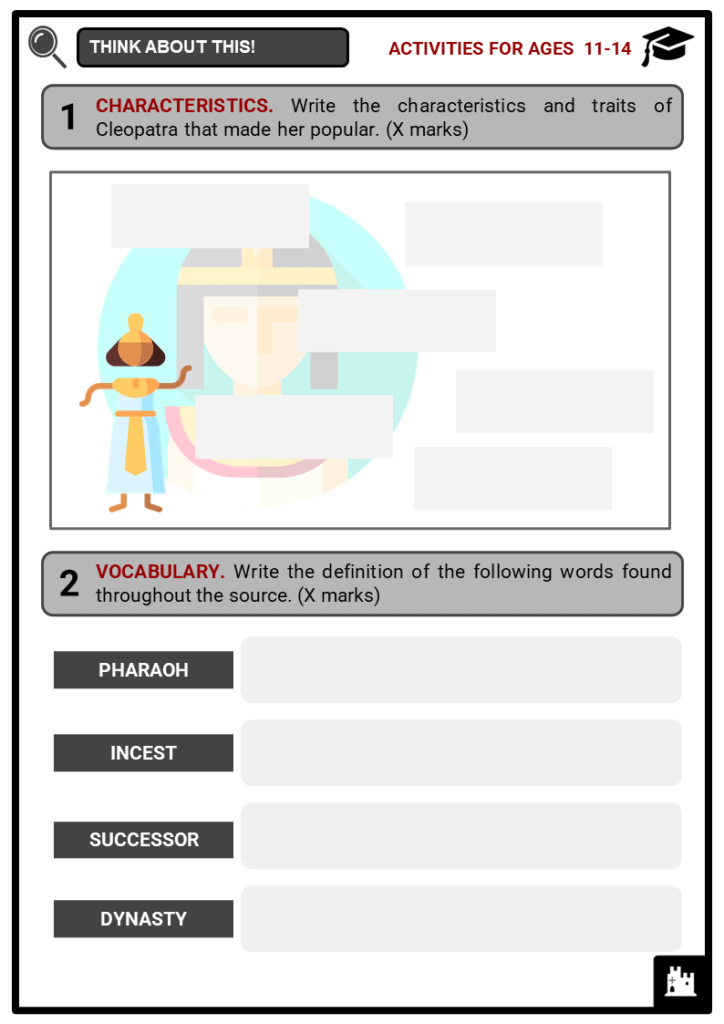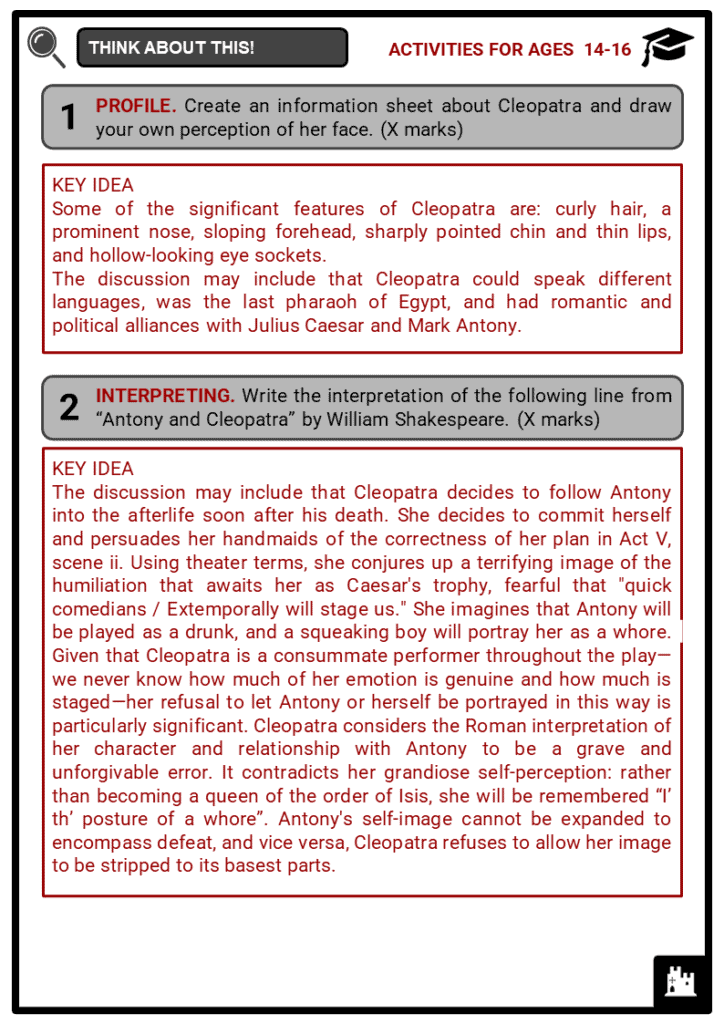Download Cleopatra Worksheets
Do you want to save dozens of hours in time? Get your evenings and weekends back? Be able to teach Cleopatra to your students?
Our worksheet bundle includes a fact file and printable worksheets and student activities. Perfect for both the classroom and homeschooling!
Table of Contents
Add a header to begin generating the table of contents
Summary
- Early life and ascension to the throne
- Cleopatra’s relationship with Julius Caesar
- Cleopatra’s relationship with Mark Antony
- Struggle for power and death
- The reign and legacy of Cleopatra
Key Facts And Information
Let’s find out more about Cleopatra!
- Cleopatra VII Philopator was the last active ruler of the Ptolemaic Kingdom of Egypt. She was part of a dynasty of Macedonian rulers founded by Ptolemy, who served as general under Alexander the Great. Cleopatra ruled ancient Egypt as co-regent, with her father, two younger brothers, and her son, for about three decades.
- Cleopatra was able to speak various languages and she was the only Ptolemaic ruler to learn the Egyptian language.
- During her reign, she forged political alliances and had romantic liaisons and military alliances with the Roman leaders Julius Caesar and Mark Antony. Cleopatra was also the last true Pharaoh of Egypt that ruled an empire including Egypt, Cyprus, part of modern-day Libya and other territories in the Middle East.
Early Life And Ascension To Throne
- Born in around 70 or 69 BC, Cleopatra was the daughter of King Ptolemy XII Auletes and Cleopatra V. She was destined to become the last queen of the Macedonian dynasty that ruled Egypt between the death of Alexander the Great in 323 BCE and its annexation by Rome in 30 BCE. Ptolemy, Alexander's general who later became King Ptolemy I Soter of Egypt, founded the line.
- When Ptolemy XII Auletes died in 51 BC, the throne was passed to his children, Ptolemy XIII and Cleopatra. Official papers began listing Cleopatra as the sole ruler on August 29, indicating that she had rejected her brother Ptolemy XIII as a co-ruler. It is likely, but not proven, that the two married soon after their father’s death. By the reign of Cleopatra, sibling marriage, which was first introduced by Ptolemy II and Arsinoe II, was considered as normal arrangement for Ptolemaic rulers which was then loathed by contemporary Greeks.
- Despite the 18-year-old Cleopatra being the dominant ruler, Ptolemy XIII still retained powerful allies, especially the eunuch Potheinos who was his childhood tutor, regent, and administrator of his properties. Others involved in the cabal against Cleopatra included Achillas, a prominent military commander, and Theodotus of Chios, another tutor of Ptolemy XIII.
- By the autumn of 50 BC, Ptolemy XIII had gained the upper hand in their battle and began signing documents with his name before that of Cleopatra, followed by the formation of his first regnal date in 49 BC.
- Ptolemy's advisers acted against Cleopatra soon after the siblings' ascension to the throne, forcing her to abandon Egypt for Syria in 49 B.C. She gathered a mercenary army and returned to Pelusium, Egypt's eastern border, the next year to battle her brother's forces in a civil war. Meanwhile, after permitting the assassination of the Roman leader Pompey, Ptolemy XIII welcomed Julius Caesar, Pompey's opponent, to Alexandria. Cleopatra reportedly smuggled herself into the royal palace to plead her case with Caesar in order to gain his support for her cause.
Relationship With Julius Caesar
- Cleopatra was forced to leave Egypt for Syria, where she raised an army before facing her brother at Pelusium, on Egypt's eastern border, in 48 BC. The assassination of Pompey, a Roman general who had sought asylum in Pelusium from Ptolemy XIII, and the arrival of Julius Caesar, restored temporary peace.
- If Cleopatra was to reclaim her reign, she realized she would need Roman support, specifically Caesar's support. Each was determined on using the other. Caesar sought money to repay the debts made by Cleopatra's father, Auletes, as he fought to keep his throne.
- After four months of war between Caesar's outmanned army and Ptolemy XIII's, Roman reinforcements came, forcing Ptolemy to abandon Alexandria and he was believed to have drowned in the Nile River. Entering Alexandria as an unpopular conqueror, Caesar reinstated Cleopatra and her younger brother Ptolemy XIV to the throne.
- Caesar stayed in Egypt with Cleopatra for a while, and she gave birth to Ptolemy Caesar in 47 B.C. He was believed to be Caesar’s child, and was known by the Egyptian people as Caesarion, or Little Caesar.
- Caesar took two years to put out the final flames of Pompeian opposition. In 46 BC, he returned to Rome and held a four-day triumph — a ceremony honouring a general following a victory over a foreign enemy — during which Arsinoe, Cleopatra's younger and hostile sister, was paraded.
- Cleopatra paid at least one state visit to Rome, accompanied by her Ptolemy and her son. She may have been present to witness the dedication of a golden statue of herself in the temple of Venus Genetrix, the ancestress of the Julian family to which Caesar belonged, which was located beyond the Tiber River.
- Cleopatra returned to Egypt after Caesar's assassination in March 44 BC.
- Ptolemy XIV was assassinated soon after, possibly by Cleopatra's agents.
- The three-year-old Caesarion was declared co-regent with his mother as Ptolemy XV.
- Cleopatra had identified herself with the goddess Isis, Osiris' sister-wife and Horus' mother, by this time.
- This was in accordance with the ancient Egyptian practice of linking royalty with divinity to strengthen kings and queens' positions. Cleopatra III had also claimed to be linked to Isis, and Cleopatra VII was dubbed the "New Isis." Plutarch claims she spoke up to a dozen languages and was known for her "irresistible charm."
Relationship With Mark Antony
- Meanwhile, at Rome, a conflict erupted between Caesar's allies (Mark Antony, Octavian, and Lepidus) and his assassins (Brutus and Cassius). Both parties requested Egyptian assistance, and after some deliberation, Cleopatra sent four Roman legions stationed in Egypt by Caesar to support the triumvirate.
- Mark Antony, who was now in charge of Rome's eastern provinces, sent Cleopatra to explain her role in the aftermath of Caesar's assassination. She headed out for Tarsus, Asia Minor, with presents in tow, having delayed her departure to heighten Antony's expectations. She arrived in the city via barge, sailing up the Cydnus River in the robes of the new Isis.
- Antony, who equated himself with the god Dionysus, was seduced. He went to Alexandria, forgetting his wife, Fulvia, who was in Italy trying her best to defend her husband's interests against the mounting menace of young Octavian. He regarded Cleopatra as an independent monarch, not as a "protected" sovereign. He agreed to protect Egypt and Cleopatra's throne in exchange for her younger sister and rival Arsinoe's removal from exile.
- Cleopatra and Antony founded a society of "inimitable livers" at Alexandria, whose members led lives that some historians read as debauchery and stupidity, while others interpret as devotion to the mythical god Dionysus.
- Cleopatra gave birth to twins, Alexander Helios and Cleopatra Selene, in 40 BC. Antony had already departed Alexandria for Italy, where he was forced to make a temporary agreement with Octavian. He married Octavia, Octavian's sister, as part of the agreement (Fulvia having died).
- Three years later, Antony was convinced that he and Octavian could never come to terms. He returned to the east and reunited with Cleopatra - his marriage to Octavia having become irrelevant. Cleopatra demanded the return of most of Egypt's eastern empire, including significant areas of Syria and Lebanon, as well as the rich balsam orchards of Jericho, in exchange for Antony's financial support for his postponed Parthian invasion.
Struggle For Power And Death
- Both the Parthian campaign and the temporary acquisition of Armenia were costly defeats. Antony did, however, return triumphantly to Alexandria in 34 BC after which came the "Donations of Alexandria" celebration. Crowds gathered to the Gymnasium to witness Cleopatra and Antony seated on golden thrones on a silver platform, with their children sitting beside them on slightly lower thrones.
- Antony declared Caesarion to be Caesar's son, effectively declaring Octavian, Caesar's adopted son and successor, to be illegitimate. Cleopatra was known as the Queen of Kings, and Caesarion was known as the King of Kings.
- This triggered a propaganda war between him and Octavian, who claimed Antony was completely under Cleopatra's control and that he would depart Rome and establish a new city in Egypt. The Roman Senate deprived Antony of all his titles in late 32 BC, and Octavian waged war on Cleopatra.
- On September 2, 31 BC, Octavian fought the united forces of Antony and Cleopatra in the naval Battle of Actium, which was a disaster for the Egyptians. Antony and Cleopatra fled to Egypt, Cleopatra's ships left the battle and retreated to Egypt, and Antony was able to break away and pursue her with a small fleet. When Octavian's army attacked Alexandria, Antony heard a rumor that Cleopatra had committed suicide. He collapsed on his sword and died just as word came that the story was false.
- Cleopatra locked herself in her chamber with two of her female servants on August 12, 30 BC, after burying Antony and meeting with the victorious Octavian. Her cause of death is unknown, but Plutarch and other writers speculated that she killed herself at the age of 39 with a poisonous snake known as the asp, a sign of heavenly royalty.
- Cleopatra was buried alongside Antony at a yet-to-be-discovered location after her death on August 12, 30 BC, leaving Octavian, later known as Emperor Augustus I, to celebrate his conquest of Egypt and consolidation of power in Rome. Egypt became a province of the Roman Empire upon Cleopatra's death.
Reign And Legacy
- Cleopatra's life has fascinated historians, storytellers, and the general public in the centuries since her reign. In an era when Egypt was roiled by internal and external battles, Cleopatra held the country together and proved to be as powerful a leader as any of her male counterparts.
- The vast majority of Egypt’s many hundreds of queens, although famed throughout their own land, were more or less unknown in the outside world. The queens' stories were forgotten as the dynastic period ended and the hieroglyphic script was lost, and their monuments were buried beneath Egypt's sands. Cleopatra, on the other hand, lived in an era when literacy was prevalent, and her deeds influenced the foundation of the Roman Empire; her story could not be forgotten.
- Octavian was determined that Roman history be written in a way that validated his claim to the throne. To do so, he restricted Rome's official archives and produced his own autobiography. Cleopatra's story was retained as an integral component of his since she had played such an important role in his rise to power. But it was diminished to just two episodes: her relationships with Julius Caesar and Mark Antony.
- Cleopatra was to be known as an immoral foreign woman who seduced virtuous Roman men, having lost all political legitimacy. As a result, she became a good foe for Octavian, who liked to be remembered for fighting foreigners rather than his Roman brothers.
Image sources:
- 340px-Retrato_femenino_(26771127162).jpg
- 340px-Cleopatra_and_Caesar_by_Jean-Leon-Gerome.jpg
- 480px-Marcus_Antonius_marble_bust_in_the_Vatican_Museums.jpg









